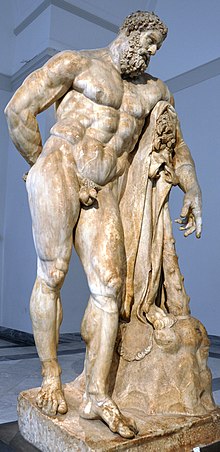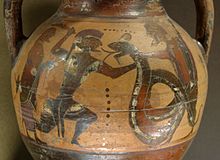ഹെരാക്ലീസ്
| Heracles | |
|---|---|
| Gatekeeper of Olympus God of strength, heroes, sports, athletes, health, agriculture, fertility, trade, oracles and divine protector of mankind | |
 One of the most famous depictions of Heracles, originally by Lysippos (Marble, Roman copy called Hercules Farnese, 216 CE) | |
| നിവാസം | Mount Olympus |
| പ്രതീകം | Club, Nemean Lion, Bow and Arrows |
| ജീവിത പങ്കാളി | Hebe |
| മാതാപിതാക്കൾ | Zeus and Alcmene |
| സഹോദരങ്ങൾ | Ares, Athena, Apollo, Artemis, Aphrodite, Dionysus, Hebe, Hermes, Helen of Troy, Hephaestus, Perseus, Minos, Iphicles, the Muses, the Graces |
| മക്കൾ | Alexiares and Anicetus, Telephus, Hyllus, Tlepolemus |
| Hercules | |
| Greek Mythology |
|---|
 |
| Deities |
| Heroes and heroism |
|
| Related |
|
ഗ്രീക്ക് പുരാണത്തിലെ നായകനാണ് ഹെരാക്ലീസ്(/ˈhɛrəkliːz/ HERR-ə-kleez; പുരാതന ഗ്രീക്ക്: Ἡρακλῆς, Hēraklēs, from Hēra, "Hera", and kleos, "glory"[1]).സിയൂസിന്റെയും അൽക്മെനെയുടെയും മകനാണ് അദ്ദേഹം.വളർത്തച്ചനായിരുന്നു ആംഫിറ്റ്രൈയോൻ.പെർസ്യൂസിന്റെ പൗത്രനും അർദ്ധസഹോദരനുമാണ് ഹെരാലീസ്അൽക്കയൂസിലാണ് അദ്ദേഹം ജനിച്ചത്[2] (Ἀλκαῖος, Alkaios) or Alcides[3] (Ἀλκείδης.ഗ്രീക്ക് നായകരിൽ ഏറ്റവും മഹാനായ നായകനാണ് ഇദ്ദേഹം ഉൽകൃഷ്ടമായ പൗരുഷവും രാജകീയമായ തലമുറയിൽ ജനിച്ചവെന്നെന്ന ഗുണങ്ങൾ ഹെരാക്ലീസിൽ കാണുന്നു.ചിതോനിക് മോൺസ്റ്റർമാർക്കെതിരെ പന്ത്രണ്ട് ഒളിമ്പിക്ക് ഓർഡർ ജയിച്ച വിജയി ആണ് അദ്ദേഹം.റോമൻ പുരാണത്തിലും ആധുനിക പശ്ച്ചിമ ലോകത്തും ഇദ്ദേഹത്തെ ഹെർക്കുലീസ് എന്ന് വിളിക്കുന്നു.ഇദ്ദേഹം പിന്നീട് കോമ്മൊഡോസ് മാക്സീമിയൻ എന്നിവരുടെ ചക്രവർത്തിയായി.റൊമൻകാർ ഗ്രീക്ക് ജീവിതരീതിയും രചനകളും സ്വീകരിക്കുകയും അതിൽ വലിയ മാറ്റമില്ലാതെ ചെറു കഥകൾ ചേർത്തവരുടെ സ്വന്തമാക്കുകയും ചെയ്തു.ഇന്നാൽ അവരുടെ നായകരുടെ ഭൂപ്രദേശം മധ്യമെഡിറ്റേറിയൻ തന്നെ ആയിരുന്നു.ഗ്രീക്ക്കാരുടെ ആരാധന രീതിയും അവർ കടമെടുത്തു.
ഹെരാക്ലീസ്സിന്റെ 12 പ്രവർത്തികൾ
- Slay the Nemean Lion.
- Slay the nine-headed Lernaean Hydra.
- Capture the Golden Hind of Artemis.
- Capture the Erymanthian Boar.
- Clean the Augean stables in a single day.
- Slay the Stymphalian Birds.
- Capture the Cretan Bull.
- Steal the Mares of Diomedes.
- Obtain the girdle of Hippolyta, Queen of the Amazons.
- Obtain the cattle of the monster Geryon.
- Steal the apples of the Hesperides (he had the help of Atlas to pick them after Hercules had slain Ladon).
- Capture and bring back Cerberus.
കുട്ടികളും സഹവാസികളും
- Megara
- Therimachus
- Creontiades
- Ophitus
- Deicoon
- Omphale
- Agelaus
- Tyrsenus
- Deianira
- Hyllus
- Ctesippus
- Glenus
- Oneites
- Macaria
- Hebe
- Alexiares
- Anicetus
- Astydameia, daughter of Ormenius
- Ctesippus
- Astyoche, daughter of Phylas
- Tlepolemus
- Auge
- Telephus
- Autonoe, daughter of Piraeus / Iphinoe, daughter of Antaeus
- Palaemon
- Baletia, daughter of Baletus
- Brettus[4]
- Barge
- Bargasus[5]
- Bolbe
- Olynthus
- Celtine
- Celtus
- Chalciope
- Thessalus
- Chania, nymph
- Gelon[6]
- The Scythian dracaena or Echidna
- Agathyrsus
- Gelonus
- Skythes
- Epicaste
- Thestalus
- Lavinia, daughter of Evander[7]
- Pallas
- Malis, a slave of Omphale
- Acelus[8]
- Meda
- Antiochus
- Melite (heroine)
- Melite (naiad)
- Hyllus (possibly)
- Myrto
- Eucleia
- Palantho of Hyperborea[9]
- Latinus[7]
- Parthenope, daughter of Stymphalus
- Everes
- Phialo
- Aechmagoras
- Psophis
- Echephron
- Promachus
- Pyrene
- none known
- Rhea, Italian priestess
- Aventinus[10]
- Thebe (daughter of Adramys)
- Tinge, wife of Antaeus
- Sophax[11]
- 50 daughters of Thespius
- 50 sons, see Thespius#Daughters and grandchildren
- Unnamed Celtic woman
- Galates[12]
- Unnamed slave of Omphale
- Alcaeus / Cleodaeus
- Unnamed daughter of Syleus (Xenodoce?)[13]
- Unknown consorts
അവലംബം
- ↑ Becking, Bob, et al.. Dictionary of deities and demons. ed. Toorn, Karel van der. Wm. B. Eerdmans Publishing. 1999
- ↑ Schmitz, Leonhard (1867). "Alceides". In William Smith (ed.). Dictionary of Greek and Roman Biography and Mythology. Vol. 1. Boston: Little, Brown and Company. p. 98. Archived from the original on 2008-05-27. Retrieved 2015-09-06.
- ↑ Bibliotheca ii. 4. § 12
- ↑ Stephanus of Byzantium s. v. Brettos
- ↑ Stephanus of Byzantium s. v. Bargasa
- ↑ Servius on Virgil's Georgics 2. 115
- ↑ 7.0 7.1 Dionysius of Halicarnassus, Roman Antiquities, 1. 43. 1
- ↑ Stephanus of Byzantium s. v. Akelēs
- ↑ Solinus, De mirabilia mundi, 1. 15
- ↑ Virgil, Aeneid, 7. 655 ff
- ↑ Plutarch, Life of Sertorius, 9. 4
- ↑ Diodorus Siculus, Library of History, 5. 24. 2
- ↑ So Conon, Narrationes, 17. In Pseudo-Apollodorus, Bibliotheca 2. 6. 3 a daughter of Syleus, Xenodoce, is killed by Heracles
- ↑ Statius, Thebaid, 6. 837, 10. 249
- ↑ Stephanus of Byzantium s. v. Amathous
- ↑ Stephanus of Byzantium s. v. Gaza
- ↑ Statius, Thebaid, 6. 346
- ↑ Servius on Virgil's Eclogue 9. 30
- ↑ Dionysius of Halicarnassus, Roman Antiquities, 1. 50. 4
- ↑ Hyginus, Fabulae, 162
- ↑ In Stephanus of Byzantium s. v. Phaistos, Rhopalus is the son of Heracles and Phaestus his own son; in Pausanias, Description of Greece, 2. 6. 7, vice versa (Phaestus son, Rhopalus grandson)
സ്രോതസ്സുകൾ
- Heracles at Theoi.com Classical literature and art
- Timeless Myths – Heracles Archived 2018-10-18 at the Wayback Machine The life and adventure of Heracles, including his twelve labours.
- Heracles, Greek Mythology Link
- Heracles (in French) Archived 2003-12-03 at the Wayback Machine
- Vollmer: Herkules (1836, in German) Archived 2012-02-16 at the Wayback Machine
- Burkert, Walter, (1977) 1985. Greek Religion (Harvard University Press).
- Kerenyi, Karl (1959). The Heroes of the Greeks. New York/London: Thames and Hudson.
അധിക വായനയ്ക്ക്
- Padilla, Mark W. (1998). "Herakles and Animals in the Origins of Comedy and Satyr Drama". In Le Bestiaire d'Héraclès: IIIe Rencontre héracléenne, edited by Corinne Bonnet, Colette Jourdain-Annequin, and Vinciane Pirenne-Delforge, 217-30. Kernos Suppl. 7. Liège: Centre International d'Etude de la Religion Grecque Antique.
- Padilla, Mark W. (1998). "The Myths of Herakles in Ancient Greece: Survey and Profile". Lanham, Maryland: University Press of America.